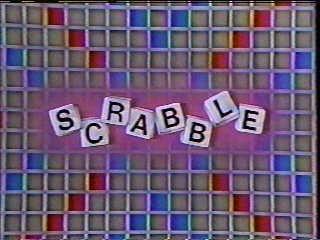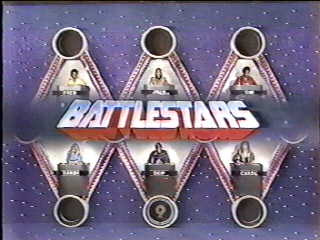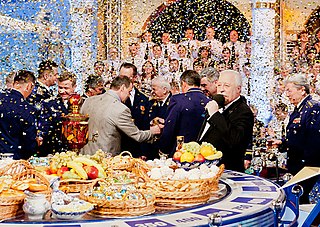
Scrabble is an American television game show based upon the Scrabble board game. Muriel Green of Exposure Unlimited developed the idea for a television game show based upon the board game concept. During 1983, Green convinced Selchow and Righter, who at that time owned the Scrabble board game, to license Exposure Unlimited to produce the game show. Exposure Unlimited co-produced the show with Reg Grundy Productions, and licensed the show to NBC. Scrabble aired on NBC from July 2, 1984, to March 23, 1990, and again from January 18 to June 11, 1993. Chuck Woolery hosted the program. Jay Stewart was the announcer for the first year. Charlie Tuna replaced him in the summer of 1985 and remained through the original run and the entirety of the 1993 revival.
Concentration is an American television game show based on the children's memory game of the same name. It was created by Jack Barry and Dan Enright. The show featured contestants matching prizes represented by spaces on a game board, which would then reveal portions of a rebus puzzle underneath for the contestants to solve.

Chain Reaction is an American television game show created by Bob Stewart, in which players compete to form chains composed of two-word phrases.

The Cross-Wits is an American syndicated game show which premiered on December 15, 1975, and lasted for five seasons until its cancellation on September 12, 1980. The show was hosted by Jack Clark, with Jerri Fiala as hostess. Announcing duties were handled by John Harlan, Jay Stewart, and Jerry Bishop. The show was produced by Ralph Edwards Productions and distributed by Metromedia Producers Corporation.

The $1,000,000 Chance of a Lifetime is an American game show which offered a $1 million (annuitized) grand prize to winning contestants. The show aired in syndication from January 6, 1986, until May 22, 1987. The show was hosted by Jim Lange, and he was joined by Karen Thomas as co-host during the second season. Mark Summers was the show's announcer for the first few weeks and Johnny Gilbert announced the remainder of the series. The show was produced by XPTLA, Inc., and distributed by Lorimar-Telepictures.

Body Language is an American game show produced by Mark Goodson Productions. The show aired on CBS from June 4, 1984, until January 3, 1986, and was hosted by Tom Kennedy. Johnny Olson announced until his death in October 1985; Gene Wood and Bob Hilton shared the announcing duties afterward, having substituted on occasion before then.

Battlestars is an American game show that aired on NBC during the 1980s. The program's concept was developed and produced by Merrill Heatter, featuring a six-celebrity panel. The object of the game is to "capture" the celebrities by lighting up numbers positioned around triangle shapes, inside of which sat each panelist. Similar to Hollywood Squares, which Heatter also co-created and produced, the celebrities are asked questions by the host, and the contestants judge the truth of their answers in order to light up the numbers.

Blackout is an American game show that was broadcast on CBS as part of its daytime schedule from January 4, 1988 until April 1, 1988. The program was created and produced by Jay Wolpert. The game features two contestants, each paired with a celebrity. Contestants attempt to solve word puzzles consisting of a sentence or short paragraph with four blank spaces. Players guess each missing word based on hearing clues recorded by their partner, but with the playback being muted or "blacked out" at certain places by their opponent.
Wheel of Fortune is an Australian television game show produced by Grundy Television until 2006, and CBS Studios International in 2008. The program aired on the Seven Network from 1981 to 2004 and January to July 2006, aired at 5:00pm from 1981 to 1989 and from 2004 to 2006 and at 5:30pm from 1989 to 2003, and is mostly based on the same general format as the original American version of the program.
The Last Word is a game show seen in syndication in the United States and on the Global Television Network in Canada that was produced by Merrill Heatter Productions and ran for 65 episodes from September 18 to December 15, 1989, with reruns continuing until January 5, 1990. The host was Wink Martindale, and the co-host/announcer was Jennifer Lyall. It was taped in Vancouver, British Columbia. In the Los Angeles-produced pilot, Burton Richardson was the announcer, and Jana White operated the computer and acted as co-host. The show was distributed by Turner Program Services.

Pole Chudes is a Soviet, later Russian adaptation of the U.S. game show Wheel of Fortune produced by VID, provided with elements of Russian culture and hosted by Leonid Yakubovich. The current rating of the show suggests it is intended for ages 16 and above, unlike the American version which is suitable for all age groups.

Wheel of Fortune is a British television game show based on the American show of the same name created by Merv Griffin. Contestants compete to solve word puzzles, similar to those used in Hangman, to win cash and prizes. The title refers to the show's giant carnival wheel that contestants spin throughout the course of the game to determine their cash and/or prizes.

Password Plus and Super Password are American TV game shows that aired separately between 1979 and 1989. Both shows were revivals of Password, which originally ran from 1961 to 1975 in various incarnations. With only subtle differences between them, both Password Plus and Super Password retained the format of play as their predecessor, with two teams of two people each—a celebrity and a contestant—attempting to guess a mystery word using only one-word clues. A new feature included a series of five passwords as clues to an overarching puzzle for the teams to solve.

Stumpers! is a game show hosted by Allen Ludden that aired on NBC from October 4 to December 31, 1976. Lin Bolen, former head of NBC Daytime Programming, developed the show. Bill Armstrong was the program's regular announcer, with Charlie O'Donnell filling in for several episodes. The show featured game play similar to Password, with two teams attempting to guess the subject of puzzles based on clues provided by their opponents.
Jumble is a British game show that aired on ITV from 12 March 1991 to 4 September 1992 and is hosted by Jeff Stevenson.

There are two Philippine versions of Wheel of Fortune. The first was aired on ABC aired from November 19, 2001 to May 31, 2002. It was hosted by Rustom Padilla and Victoria London. The second and more recent one was a program that aired on ABS-CBN, with Kris Aquino as main host, while Zara Aldana and Jasmine Fitzgerald alternated as puzzle assistants for each puzzle. Aquino's version started on January 14, 2008.
La ruleta de la fortuna or La ruleta de la suerte is the Spanish version of Wheel of Fortune. The first incarnation ran from 1990 to 1992 in Antena 3, the second one from 1993 to 1997 in Telecinco, and then, after a nine-year hiatus, a revival has been made on Antena 3 beginning in 2006. The show also airs internationally via Antena 3 Internacional.
Lingo is a British game show based on the American programme of the same name, the original iteration of the programme was made by Thames Television and Action Time for ITV, running for a single series with host Martin Daniels from 12 May to 14 July 1988. A revived version has also aired from 1 January 2021 hosted by Adil Ray.

Wheel of Fortune is an American television game show created by Merv Griffin. The show has aired continuously since January 1975. It features a competition in which contestants solve word puzzles, similar to those in hangman, to win cash and prizes determined by spinning a giant carnival wheel. The current version of the series, which airs in nightly syndication, premiered on September 19, 1983. It stars Pat Sajak and Vanna White as hosts, who have hosted the nighttime version since its inception. The original version of Wheel was a network daytime series that ran on NBC from January 6, 1975, to June 30, 1989, and subsequently aired on CBS from July 17, 1989, to January 11, 1991; it returned to NBC on January 14, 1991, and was cancelled that year, ending on September 20, 1991.

People Puzzler is an American television game show hosted by Leah Remini and broadcast by Game Show Network. It premiered on January 18, 2021. The show is inspired by the celebrity and pop-culture themed crosswords in People magazine.














